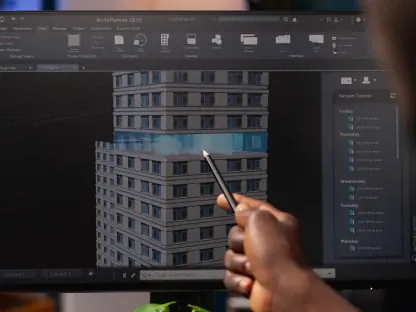Amid ongoing debates over construction speed and quality, Tennessee has enacted a new law allowing developers to hire private building safety inspectors. This legislation, spearheaded by Governor Bill Lee, aims to streamline the construction process by reducing bureaucratic delays. However, it has sparked widespread concerns about the potential for conflicts of interest and compromised safety standards.
The Move Towards Privatization of Inspections
Governor Bill Lee’s Initiative for Streamlining
Governor Bill Lee, leveraging his extensive experience in the construction industry, introduced this law to address what he views as unnecessary delays in the inspection process. The law allows developers to bypass traditional municipal codes departments and the State Fire Marshal’s Office by opting for private inspectors. By accelerating the project approval process, he believes developers can save costs and complete projects more swiftly. However, the law’s opponents argue that this shift toward privatization comes with significant risks.The policy is rooted in the pragmatic, business-oriented perspective that “time is money.” Lee’s 35-year tenure in the construction business has shaped his belief that bureaucratic red tape stifles economic efficiency. With this backdrop, the legislation aims to reduce the time taken for project approvals, thereby cutting down on the costs associated with delays. This initiative is intended to foster a more dynamic construction environment, potentially attracting more investments into Tennessee’s real estate sector. However, critics underscore that removing traditional oversight mechanisms introduces several significant risks that cannot be ignored.
Scope of the New Inspection Law
The new legislation is broad in scope. It covers environmental reviews, safety standard compliance, and construction site assessments. This extensive reach means that nearly all aspects of construction oversight could be handled by privately hired inspectors rather than by public regulatory bodies. Critics fear that this extensive privatization may lead to a decline in overall building safety and environmental protection. This fear pivots on the argument that private inspectors, paid directly by developers, may be incentivized to overlook violations to maintain favorable relationships.The extent of privatization proposed raises deep concerns among safety advocates who caution that private inspectors might prioritize developer interests over public safety. The law’s sweeping coverage, encapsulating everything from environmental assessments to structural integrity checks, creates various possible conflict points given the direct commercial relationships involved. As developers opt for private inspections, questions arise about whether these inspectors will rigorously uphold safety and environmental standards or if economic incentives will lead to lenient reviews and potential oversights. This change brings both pragmatic hopes for efficiency and critical apprehensions about safety into a sharp, contentious focus.
Safety and Integrity Concerns
Conflicts of Interest and Oversight Risks
Critics, including various building officials and safety advocates, have voiced concerns about the potential conflicts of interest inherent in the new law. Monty Kapavik of the Tennessee Building Officials Association highlighted that private inspectors might prioritize the developer’s interests over stringent safety standards. This concern is not just theoretical. Issues of oversight may arise where private inspectors approve projects that do not fully adhere to established safety codes. The risk is that without the necessary checks and balances, the integrity of Tennessee’s building standards could be jeopardized.This potential conflict of interest becomes particularly concerning when considering the financial relationships between developers and private inspectors. If an inspector’s continued employment depends on satisfying the developer, critics argue that this could result in compromised inspections. These concerns are not without precedent, as history has shown instances where inadequate oversight led to structural failures and risk to public safety. Therefore, it is posited that maintaining rigorous checks and balances through independent public agencies is essential to ensure that all construction projects meet stringent safety criteria.
Public Safety at Stake
Public safety is a paramount concern for those opposing the law. Aaron Rogge, a seasoned civil engineer, pointed out that the law could enable “bad actors” to slip through the cracks. By minimizing governmental oversight, the chances of cutting corners or neglecting critical safety measures increase. The contention is that while developers may benefit financially from expedited processes, the broader public could pay the price in terms of compromised safety. These concerns resonate strongly, particularly in light of past incidents where insufficient oversight has led to catastrophic failures.The fear that “bad actors” could exploit the system is more than just a hypothetical scenario; it reflects genuine risks based on historical examples where reduced oversight led to detrimental outcomes. Critics emphasize that the public stands to suffer the most if building integrity is compromised. They cite previous cases where lax inspections resulted in structural failures, drawing a direct correlation between inspection rigor and safety assurance. Thus, even as the law promises economic efficiencies, the trade-off in terms of potential public safety risks looms large, forcing a re-evaluation of whether speed should trump thoroughness in construction projects.
Debates Over Wait Times and Efficiency
Advocates of Privatization
Proponents of the law, including Governor Lee and commercial real estate development associations, argue that the move toward privatization will significantly cut down on project delays. They assert that bureaucratic inefficiencies have historically led to costly postponements, burdening developers with unexpected expenses. Rachel Blackhurst, the Tennessee-based director of government affairs, emphasized the financial impact of delays, stressing the necessity of predictability and swift processing times. From this perspective, private inspections are seen as a pragmatic solution to an entrenched problem.The argument in favor of privatized inspections centers on enhancing economic efficiency by chopping down the time required for project approvals. Advocates highlight the cumbersome processes within public regulatory frameworks where layers of bureaucracy often slow down progress. They argue that a streamlined, privatized inspection system will not only cut down delays but also make the overall development process more predictable and financially viable. By focusing on the premise that time-saving equates to cost-saving, proponents see this legislative change as a necessary evolution to adapt to market demands and foster an environment conducive to rapid growth and development.
Analyzing Current Wait Times
Despite these arguments, current wait times for inspections in various Tennessee cities, such as Memphis, Nashville, and Knox County, and through the State Fire Marshal’s Office, are relatively short. Data indicates that average wait times range from same-day approvals to up to six days for complex projects. This raises questions about whether the perceived delays are as significant as proponents suggest. Critics argue that these wait times do not justify a wholesale shift to privatization, particularly when weighed against the potential risks to safety and environmental standards.The relatively short wait times for inspections across different regions in Tennessee suggest that existing public inspection systems are already efficient to a significant degree. By offering same-day approvals or maximum wait times of six days for more complex projects, the current framework appears to address many of the timelines that proponents claim are problematic. Consequently, critics challenge the necessity of such a dramatic legislative shift, emphasizing that the benefits of marginally quicker approvals do not outweigh the potential costs to safety and environmental integrity. They argue that the foundational purpose of inspections is to ensure public safety and environmental protection, objectives that should not be compromised in pursuit of mere administrative expediency.
The Issue of Wetlands Permits
Extended Privatization into Environmental Reviews
The law also extends the option of privatization to wetlands permits, permitting developers to hire their own consultants if state reviews take over 30 days. This has raised fresh concerns about environmental protections. Past legislative attempts to deregulate wetlands protections were defeated, underscoring the contentious nature of this issue. Environmental advocates argue that wetlands play a critical role in maintaining ecosystem balance, preventing floods, and supporting wildlife. The fear is that privatized oversight might result in less stringent environmental reviews, leading to long-term ecological damage.The inclusion of wetlands permit reviews under the privatization scope further amplifies the debate about environmental integrity. Given the essential role wetlands play in ecological balance and their inherent sensitivity, critics argue that privatizing these reviews invites potential conflicts of interest similar to those in building safety inspections. By allowing developers to hire their own environmental consultants, the risk arises that these consultants might underreport or overlook critical details to expedite projects. The contentious history of attempts to deregulate wetlands underscores deep concerns about maintaining stringent standards essential for preserving these environmentally significant areas.
Environmental Stewardship Under Threat
Allowing developers to hire their own wetlands consultants could lead to a conflict of interest similar to building safety inspections, where the oversight needed to protect these sensitive areas may be compromised. Environmental advocates argue that wetlands play a critical role in maintaining ecosystem balance, preventing floods, and supporting wildlife. The fear is that privatized oversight might result in less stringent environmental reviews, leading to long-term ecological damage. This scenario poses a stark trade-off between the short-term economic gains of streamlined processes and the long-term sustainability of vital environmental resources.The potential environmental risks associated with privatizing wetlands permit reviews highlight critical concerns about stewardship and accountability. Critics emphasize the irreplaceable functions of wetlands in flood mitigation, water purification, and habitat provision. The concern is that private consultants, motivated by developer interests, might prioritize project approval over rigorous ecological assessments, leading to irreversible damage. Environmentalists argue for maintaining stringent state oversight to safeguard these critical natural resources, asserting that the economic benefits of expedited reviews do not justify the potential long-term ecological costs. This conflict brings to the fore broader debates about balancing economic development with sustainable environmental practices.
Balancing Economic Efficiency and Safety
The Economic Benefits Argument
Supporters of the new law underscore the economic advantages of reducing bureaucratic delays. They argue that faster project completion translates into lower costs and potentially more investment in Tennessee’s real estate market. From an economic standpoint, predictability and swift approval processes are paramount. Developers need assurance that their projects will start and finish on time, free from administrative hold-ups. This, in turn, could attract more business to the state, fostering growth and development.Economic proponents advocate that reducing bureaucratic delays is critical for maintaining a competitive edge in the marketplace. They stress the importance of predictability in project timelines, asserting that predictable and swift approval processes are not just beneficial but necessary for developers. By ensuring projects start and complete without administrative interruptions, the law is posited as a catalyst for attracting more investments into Tennessee. As the state’s construction sector becomes synonymous with efficiency, this could potentially lead to a boom in development activities, resulting in substantial economic growth, job creation, and enhanced market competitiveness.
The Price of Safety and Environmental Protection
Tennessee has recently passed a new law that permits developers to hire private building safety inspectors, aiming to accelerate the construction process. Promoted by Governor Bill Lee, the legislation intends to cut through bureaucratic red tape, thereby expediting development projects. This move has been praised for its potential to speed up completion times, addressing the evolving needs of the state’s growing population and economy. However, the new law has also ignited significant concerns among various stakeholders. Critics argue that allowing private inspectors might lead to conflicts of interest, with developers possibly exerting undue influence on them. There’s a fear that this shift could undermine safety standards, potentially posing risks to public safety. The debate continues as proponents assert that the measure will lead to more efficient construction practices, while opponents urge vigilance to maintain rigorous safety checks. The balancing act between efficiency and safety remains a critical focal point in the conversation surrounding this new legislative change.









